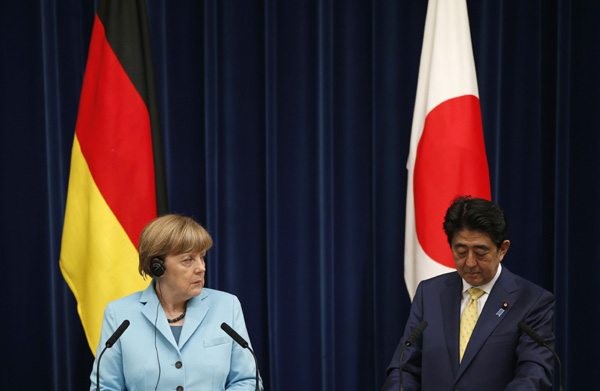High time for Japan to learn from Germany's reflection on history
(Xinhua) Updated: 2015-03-09 18:23
 |
|
Germany's Chancellor Angela Merkel (L) and Japan's Prime Minister Shinzo Abe attend their joint news conference after their talks at Abe's official residence in Tokyo March 9, 2015. [Photo/Agencies] |
TOKYO - Visiting German Chancellor Angela Merkel on Monday taught a valuable lesson to Japan over how her country was accepted by its European neighbors and the international community after the end of World War II, noting that Japan should look at its own history squarely.
During a Q&A session after her address here, regarding a question about Japan's relations with China and South Korea over historical issues, the German leader said her country was lucky to be reintroduced and accepted by the international community after the horrible days during the Nazi rule and the holocaust.
"I think it was possible first because Germany did face its past squarely," said Merkel, adding that Europe has learnt from centuries of war and "one of the greatest achievements was the reconciliation between Germany and France."
"Today it can be safely called Franco-German relationship. The French have made just as valuable contributions as Germans have. Without the generous gestures from our neighbors, it would not have been possible. There was also a readiness in Germany to face our own history openly and squarely," said Merkel.
Merkel's remarks came at a time when Japan's neighbors are becoming increasingly concerned over Prime Minister Shinzo Abe's right-leaning politics and moves towards historical revisionism, as he has indicated that he will change key wordings in the world- recognized Murayama Statement, which apologized for Japan's wartime brutalities, in his new war anniversary speech and will revise Japan's pacifist constitution as his ultimate political goal.
The German leader's comments also fiercely criticized Japanese rightists who spare no efforts to deny and whitewash the country' s wartime atrocities, including the Nanjing Massacre and the issue of "comfort women," a euphemism for sex slavery, involving forcibly recruiting and coercing women to service the Japanese Imperial Army during the war.
It is no coincidence that the German leader paid her first visit to Japan in seven years, at a time when the world will mark the 70th anniversary of the end of WWII, and, for Japan, it should understand the true meaning behind the move -- the international community is closely watching what Abe's administration is doing.
It is high time for Japan to look squarely at its wartime history and reconcile with its neighbors first, and then it will be possible for the country to be viewed and accepted by the international community without suspicion or doubt of its true motives.
- Japan's smart toilet seats made in China
- Visiting Merkel reminds Japan to face wartime past
- Japan's attitude toward the war makes a difference
- Time bomb damages Japan's ties with China
- Japan's attitude toward the war makes a difference
- Time bomb damages Japan's ties with China
- Japan's attitude toward the war makes a difference






